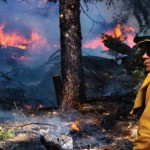- DETERRENCE: Simulating War Might Be the Best Way to Prevent One
- ENERGY SECURITY: Why the US Needs to Lift the Ban on Oil Exports
- GOVERNANCE AND CIVIL SOCIETY: Environmental Repair Emerges as an Industry in China
- CLIMATE CHANGE ADAPTATION: The 2014 Quadrennial Homeland Security Review
- CLIMATE CHANGE AND SECURITY: Climate change 2014: House Bills Would Make it Harder to Fight the National Security Threats Posed by Global Warming
 DETERRENCE: Simulating War Might Be the Best Way to Prevent One, Patrick Tucker, Defense One, July 14, 2014
DETERRENCE: Simulating War Might Be the Best Way to Prevent One, Patrick Tucker, Defense One, July 14, 2014
The Pentagon spends 3-4 billion a year on simulated battlefield training to prepare US military forces for combat in the Joint Training and Experimentation Network. Software used in NATO such as Virtual Battle Space has begun to integrate biographic and performance data for individual soldiers—and drawing from social media—from individual enemies.
- Latest ‘Virtual Battle Space’ release adds realism to scenarios, avatars, C. Todd Lopez, ARNEWS, April 3, 2014
- Live and Virtual Assets Train Jointly, John Kostoff, Signal Magazine, June 2010
- Mapping the Military–Industrial–Media–Entertainment–Network, James Der Derian, Routledge, 2009
ENERGY SECURITY: Why the US Needs to Lift the Ban on Oil Exports, Opinion, Daniel Yergin and Kurt Barrow, Wall Street Journal (18 June 2014)
A lucrative cottage industry ran for a few decades – modeling world oil as an exhaustible resource, and analyzing scenarios of supply disruptions and their economic impacts on the US. Thanks to technology and finance, now the Middle East doesn’t roil world oil markets much, and US could return to oil exports. It is a validation of Morris Adelman advice, “World oil is finite, but nobody knows what the limits are,” and “What matters is not what is in the ground but the marginal cost of extraction.”
- Energy: The indispensable country, Ed Crooks and Anjli Raval, Financial Times (15 July 2014)
- Morris A. Adelman dies at 96; saw oil as inexhaustible, Obituary, Douglas Martin, New York Times (8 June 2014)
 GOVERNANCE AND CIVIL SOCIETY: Environmental Repair Emerges as an Industry in China, Want China Times, 29 July 2014
GOVERNANCE AND CIVIL SOCIETY: Environmental Repair Emerges as an Industry in China, Want China Times, 29 July 2014
Restoring damaged environments is emerging as a new industry as China struggles to implement reforms to clean its environment. Environmental protection and the improvement of livelihood are now included as indicators in evaluating the performance of officials, and the role of the judiciary has been enlarged to deal with environmental conflicts. China is facing difficulty in attracting internationals due to high pollution levels.
- China’s dirty pollution secret: The boom poisoned its soil and crops, He Guangwei, Yale Environment 360 (30 June 2014)
- China strengthens environment watch in auditing of officials’ economic performance, Xinhua (27 July 2014)
- Coca-Cola offers expats China pollution hazard pay, Lisa Murray and Angus Grigg, Financial Review (8 July 2014)
 CLIMATE CHANGE ADAPTATION: The 2014 Quadrennial Homeland Security Review, U.S. Department of Homeland Security, USA (June 24, 2014) [9.72 MB, PDF]
CLIMATE CHANGE ADAPTATION: The 2014 Quadrennial Homeland Security Review, U.S. Department of Homeland Security, USA (June 24, 2014) [9.72 MB, PDF]
2014 Quadrennial Homeland Security Review highlights ongoing areas of priority (as well as renewed areas of emphasis) to guide strategic planning for the agency. To this end, the report does acknowledge climate change as a “threat multiplier” and notes that natural hazards are becoming more costly to address, with increasingly variable consequences due in part to drivers such as climate change and interdependent and aging infrastructure.
- Homeland Security, U.S. Department of Homeland Security, Washington D.C., USA (2014)
- Climate Change & National Security, American Security Project (ASP), , Washington D.C., USA (2014)
 CLIMATE CHANGE AND SECURITY: Climate change 2014: House Bills Would Make it Harder to Fight the National Security Threats Posed by Global Warming, Maria Gallucci, International Business Times (16 July 2014)
CLIMATE CHANGE AND SECURITY: Climate change 2014: House Bills Would Make it Harder to Fight the National Security Threats Posed by Global Warming, Maria Gallucci, International Business Times (16 July 2014)
Houston, we have a problem…
Item 1: Amendment to the National Defense Authorization Act: “None of the funds authorized to be appropriated or otherwise made available by this Act may be used to implement the U.S. Global Change Research Program National Climate Assessment, the Intergovernmental Panel on Climate Change’s Fifth Assessment Report, ….”
Item 2: “The climate change we are currently seeing is largely the result of human activity.” Agree – China 93%, U.S. 54%.
- Americans more skeptical of climate change than others in global survey, Michael Roppolo, CBS News (23 July 2014)
- Environment, Global Trends 2014, Ipsos MORI
- Harvard historian: strategy of climate science denial groups ‘extremely successful’, Graham Readfearn, Planet Oz blog, The Guardian (25 July 2014)
The Nautilus Peace and Security Weekly Report presents articles and full length reports each week in six categories: Austral security, nuclear deterrence, energy security, climate change and security, the DPRK, climate change adaptation and governance and civil society. Our team of contributors carefully select items that highlight the links between these themes and the three regions in which our offices are found—North America, Northeast Asia, and the Austral-Asia region.
- Subscribe to NAPSNet to receive free weekly email reportsEditor
Contributors:
- Deterrence: Peter Hayes
- DPRK: Roger Cavazos
- Governance and Civil Society: Dyana Mardon
- Energy Security: Nikhil Desai
- Climate Change Adaptation: Saleem Janjua
- DPRK: Roger Cavazos
- Austral Peace and Security: Richard Tanter


